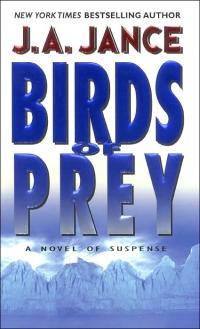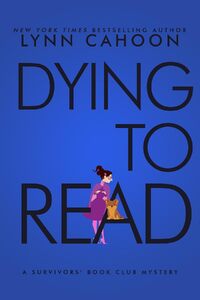 SHOPGIRLS |
 The books of May are here—fresh, fierce, and full of feels. |

Purchase
J. P. Beaumont Series, #15 Mystery, Thriller Excerpt of Birds of Prey by J.A. JanceChapter One The blonde fixed me with an appraising eye that left me feeling as defenseless as a dead frog spread-eagled on some high school biology student's dissection tray. "And what do you do?" she asked. When the headwaiter had led me through the cruise ship's plush, chandelier-draped dining room to a round table set for six, four of the chairs were already occupied by a group of women who clearly knew one another well. They were all "women of a certain age," but the blonde directly across from me was the only one who had gone to considerable effort to conceal the ravages of time. I had taken one of the two remaining places, empty chairs that sat side by side. When I ordered tonic with a twist, there was a distinct pause in the conversation. "Very good, sir," the waiter said with a nod before disappearing in the direction of the bustling waiters' station, which was directly to my back.For the better part of the next five minutes the conversation continued as before, with the four women talking at length about the generous divorce settlement someone known to all of them had managed to wring from the hide of her hapless and, as it turned out, serially unfaithful ex-husband. The general enthusiasm with which my tablemates greeted the news about a jerk being forced to pay through the nose told me I had fallen into an enemy camp made up of like-minded divorcées. So I wasn't exactly feeling all warm and fuzzy when the ringleader of the group asked her question. The fact that I was on a heaving cruise ship named Starfire Breeze pitching and bucking my way into Queen Charlotte Sound toward the Gulf of Alaska did nothing to improve my disposition. With little to lose, I decided to drop my best conversational bomb. "I'm a homicide detective," I told the women mildly, taking a slow sip of my icy tonic which had arrived by then. "Retired," I added after a pause. I had put in my twenty years, so retired is technically true, although "retired and between gigs" would have been more accurate. However, it didn't seem likely that accuracy would matter as far as present company was concerned. So retired is what I said, and I let it go at that. Over the years I've found that announcing my profession to a group of strangers usually cripples polite dinnertime small talk. Most people look at me as though I were a distasteful worm who has somehow managed to crawl out from under a rock. They give the impression that they'd just as soon I went right back where I came from. Then there are the occasional people who set about telling me, in complete gory detail, everything they know about some obscure and previously unsolved crime with which they happen to be personally acquainted. This tactic always serves to turn dinner into an unpleasant parlor game in which I'm set the lose/lose task of coming up with the solution to an insoluble mystery. No winners there. Surprisingly enough, the blonde took neither option A nor option B. Instead, she gave me a white-toothed smile that was no doubt as phony and chemically augmented as the rest of her. "My name's Margaret Featherman," she announced cordially, standing and reaching across the table with a jewel-bedecked, impeccably manicured hand. She gave me a firm handshake along with an unobstructed view of a generous cleavage. "These are all friends of mine," she chirped. "We went to college together. This is Naomi Pepper, Sharon Carson, and Virginia Metz." As she gestured around the table, each of the women nodded in turn. "The four of us are having our annual reunion. And you are?" Margaret prompted, resuming her seat. She had a gravelly voice that made me want to clear my throat. I pegged her as a smoker or maybe an ex-smoker. "Beaumont," I told her. "J. P. Beaumont." I didn't voluntarily elaborate on the Jonas Piedmont bit any more than I had on my employment situation. Nothing was said, but she frowned slightly when I said my name, as though it displeased her somehow. It occurred to me that maybe she had been expecting to hear some particular name, and Beaumont wasn't it.Although the other three women had been chatting amiably enough when I first arrived, now they shut up completely, deferring to Margaret Featherman as though she were the only one of the group capable of human speech. Whatever it was that had disturbed Margaret about my introduction, she regained her equanimity quickly enough. "Now that we're out from behind Vancouver Island, the water is a little choppy," she allowed a few seconds later. "I suppose your wife is feeling a bit under the weather." She gave a helpful hint by nodding pointedly in the direction of the empty chair beside me. "I'm a widower," I said. Again, that wasn't quite the whole story. If a wife dies in less than a day, is her husband still legitimately a widower? And if a first wife dies years after a divorce and it still hurts like hell to lose her to the big C, are you not a widower then? After all, Karen and I may have been divorced, but we had two children together and were still connected in a way no legal document could ever quite sever. Even now I'm surprised by how much her death continues to grieve me. Maybe if I were still drinking, I'd be in such an emotional fog that I wouldn't notice. But I'm not, so I do, and that wasn't any of this nosy broad's business, either. "My wives are dead," I added brusquely. "Both of them." So much for winning friends and influencing people. I expected the comment to shut her... Excerpt from Birds of Prey by J.A. Jance |
|
| |||
|
||||



 © 2003-2025
© 2003-2025